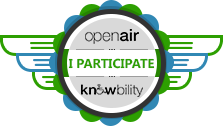Awareness
Years after my injury, I began volunteering at the Brain Injury Association of America (BIAA). I wanted to be useful and I needed something to do until I could find more rehabilitation (or job coaching help) to help me on my path to getting back to work after my injury.
Robert Demichalis, a volunteer advocate at BIAA, had an extra desk in his office and offered it to me. Suddenly, I had a place to go to! I began going out to BIAA once a week. Robert took me under his wing and provided me with a vocabulary with which to advocate about brain injury. And, at some point, I began calling myself an advocate.
Hidden Disability
Since people could not see my injury, they often did not know what to make of me. Often, they would think that I should know the answers to PhD level economics which were somewhere back in my brain, but not easy for me to access on short notice. If I tried to tell them about my injury, I often heard, “well, you look fine.” I often did not know what to say to them.
In addition, people who met me for the first time would often confuse me for someone helping others with brain injury who had more obvious physical disabilities than mine. It was not until I spoke about my disability and how it affected me (usually as part of a prepared speech) that strangers or students would realize that I had a disability myself. It was during a speaking engagement at Dr Alison August’s class at Argosy University that I began being aware of how my words helped educate others about the persistent effects of my concussion. I was speaking at Dr August class as a member of the Speakers Bureau of Brain Injury Services of Northern Virginia.
Advocacy
I began to learn to advocate better for myself by practicing a sentence or two of prepared text from one of my speeches. Eventually I was able to write a speech (with the help of others) about how I learned to advocate better for myself with others and the influence that the opportunity to speak with others in the group taught me increased self-awareness about my injury.
When I told people I was an advocate, I was often asked the question, “well, who do you advocate to?” This was another question that I could not answer. And I had to learn how to answer it, through practice and persistence. I have come to realize, through the help of many others who did not have a brain injury and some who did, that any time I spoke out about my injury, I was advocating for people with traumatic brain injury and people with concussion.
I came to realize that public speaking was advocacy.
I came to realize that raising awareness was advocacy.
And I came to realize that advocacy was hope.
And it all fed back on itself in a positive loop.
The more I could help others understand the issues that I was struggling with, the more I could get appropriate health care resources.
The more I could get appropriate health resources, the more I could get better.
The more I got better, the more I could help raise awareness for others.
The more I could raise awareness with others, the more I could help others with similar cognitive issues get the help they needed also.
The more I spoke out, the more I helped others articulate the problems they were having that they could not yet articulate either.
When I was given the opportunity, I worked hard to tell my story to the members of the media so that they could tell my story for me.
Hope
It made my life meaningful to know that others would take articles written about my journey and underline things that about their experience or their journey that they could not yet articulate for themselves and that my words would help them. This phenomena began happening the most, with the article in The Washingtonian Magazine entitled “’I wanted My Brain Back:’ What happens when you’re a PhD economist and you suddenly cannot remember things or think straight? One woman’s story of perseverance reveals some of the mysteries of the brain.”
More recent articles by WETA/BrainLine and Austin.com about being a mom with persistent sypmtoms following concussion have inspired many and have been very meaningful to people with brain injury because they show my vulnerability. People with brain injury often tell me that these articles especially articulate the difficulties of living with a hidden disability and are particularly meaningful to them.
Advocacy = Awareness = Hope
With this website, I hope to encourage others to develop increased awareness about their injury and to tell their stories about their recoveries so that as people with brain injuries, we can get better and get better more easily and more efficiently.
My advocacy has been tremendously influenced by the success stories of others with brain injuries and the modeling that others have done for me, as well as the public speaking and the books and the Youtube videos and websites. Others advocacy for themselves and for others has helped my journey incredibly and inspired me.
I hope that my blog posts and this website will inspire others, in turn.


Recent Comments